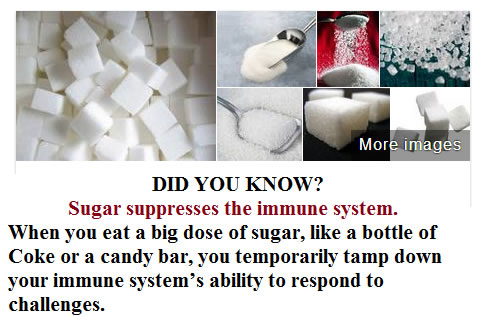 DID YOU KNOW?
DID YOU KNOW?
Sugar suppresses the immune system. When you eat a big dose of sugar, like a bottle of Coke or a candy bar, you temporarily tamp down your immune system’s ability to respond to challenges. The effect lasts for several hours, so if you eat sweets several times a day, your immune system may be perpetually operating at a distinct disadvantage.
Sugar promotes inflammation. Inflammation, which is part of the immune response, is not always a bad thing. But eating sugar foods can fuel excessive, inappropriate inflammation that serves no useful purpose and actually promotes aging and disease.
Sugar suppresses the release of human growth hormone. You know those ads in in-flight magazines that show a super-buff guy, who, thanks to a radical anti-aging program, looks about 50 even though he’s approaching 70? He’s most likely injecting himself with human growth hormone. Of course, he’s also watching his diet, spending a couple of hours a day in the gym, and using lots of self-tanner, but there’s no doubt that the hormone shots have a lot to do with his physique. Although the effects can be dramatic, hormone treatments are expensive and risky, so I don’t personally recommend this course of action. But if you want to slow down the aging process, you definitely want to do what you can to naturally enhance your body’s production of human growth hormone. Avoiding foods that are high in sugar is a good way to do that. Exercising, healthy eating, and avoiding undue stress also help.
Sugar promotes glycation. Sugar molecules treat your body like a singles bar. Once they get into your bloodstream, they start looking around for things to hook up with, like attractive protein and fat molecules. The hook-up is known as “glycation” and like most hook-ups, the results aren’t pretty. These glycated molecules act like drunken sailors, careening around your body, breaking things and peeing where they shouldn’t They produce toxic compounds called advanced glycation end products, or, AGEs. That is perhaps the most poetically-just acronym in biology, because AGEs essentially throw the aging process into fast-forward. And much of the damage done by AGEs is irreversible. If that d doesn’t motivate you to walk away from the M&Ms, I don’t know what would.
Sugar raises insulin levels. An influx of sugar into your body will have a fairly predictable result: Your blood sugar levels will zoom up. Shortly after, your pancreas will release a bunch of insulin to help clear sugar from your blood into your cells. As blood sugar levels go down, insulin levels return to normal. But when you eat a lot of sugar, you’re constantly calling for insulin, and that can backfire in a couple of ways. Over time, it takes more and more insulin to get the job done. Eventually, your pancreas may just stop responding to the call. Congratulations, you’re now an insulin-dependent diabetic. And along the way, exposing your cells and organs to chronically high insulin levels accelerates the aging process.
Healthy Food – Tips – Stay Healthy ~ Stay Happy ~ Health is true Wealth
<<<< Welcome Home >>>>





